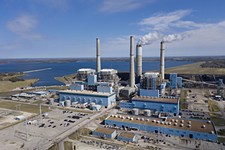Beside the Point: 'Mission of Affordability'
Can the council say no to its biggest cash cow?
By Amy Smith, Fri., Jan. 13, 2012
Now would probably be a good time for the City Council to grow a pair and reject Austin Energy's proposed rate increase as it currently stands. It's not uncommon for council members to do the opposite of what dozens – sometimes even hundreds – of citizens tell them to do on emotional issues like this one. Of course, nobody likes being told what they should do, but if ever there was a time for the council to listen to its constituents – from grassroots activists to clergy to poor people to small-business owners – it's right now. And clearly, the council will hear many variations of the "just say no" theme at a public hearing scheduled for 6pm today (Thursday, Jan. 12) at City Hall.
"By the time the hearing is over, Austin Energy is going to be as popular as people who kick puppies on YouTube," predicted Paul Robbins, whose history in environmental and consumer activism dates back several decades.
A big crowd is expected to turn out for the hearing. Many speakers will be council regulars like Robbins, but the goal is also to give folks on the dais a glimpse of the people they normally don't see. It's possible, for instance, that some of those in attendance will be among the low-income casualties of the mass evictions that grew out of the East Riverside waterfront development brouhaha a couple of years ago. Carol Biedrzycki, an advocate for low-income ratepayers, sent out an all-hands-on-deck notice to local nonprofits and other organizations last week, telling them, "WE NEED TO FILL THE COUNCIL CHAMBER."
Ask any of the leading opponents to explain why they believe the rate change is a bad deal, and within minutes they're apologizing for going off on tangents, jumping from talking point to talking point – there are so many variables involved in the case, they say. Late last week, even the most experienced rate-case pros, like consumer attorney Lanetta Cooper, were still trying to analyze some of the finer technical details – in part because the proposal has changed somewhat since it limped out of the Electric Utility Commission on a 4-3 vote in October.
Opponents want the council to slow the process – maybe give AE a small interim increase – and go over the rate proposal with a fine-tooth comb. "The [AE] consultants and the legal counsel did little or nothing to protect residential and low-income customers," said Biedrzycki, executive director of Texas Ratepayers' Organization to Save Energy. "We need some other eyes on this situation."
Are You Kidding Me?
The most glaringly offensive part of the rate increase is the plan to raise customers' existing $6 monthly fee to $22 (down slightly from the originally proposed $25). This would be in addition to how much they would pay for electricity, regardless of how much power they use. An additional $16 a month may not seem like a lot of money to those who aren't pinching pennies to stay afloat, but when Austin's poorest households already spend an estimated 40% of their income on electricity, then yeah, a $22 monthly charge is pretty outrageous. If the fixed-fee proposal passes, AE customers would pay the highest monthly charge of the state's large municipally owned utilities. (For a comparison chart and background, see "AE Rate Hike Opponents Say 'Do It Over,'" Oct. 28, 2011.)
In AE's perfect world, the utility would have a council-approved rate increase by Jan. 26 and the new plan would be implemented by the end of April. That's asking a lot within a very short timetable. For that reason, Council Members Bill Spelman and Kathie Tovo have called a special meeting for 10am Tuesday to question AE staff and EUC members. They should also query staff closely about what until recently was a secret report that the utility commissioned from consulting firm Navigant.
Much of the information contained in the "Benchmarking and Program Review," dated December 2010, is redacted because of its proprietary nature. AE originally balked at releasing the unredacted sections of the document on grounds that it's copyrighted. You could go to AE headquarters and read the report – you could even photograph it or bring your own scanner and scan it – but you couldn't make a copy. This week, after some back and forth between AE, media reps, council offices, and others, the utility relented and released the unredacted portion of the report. You can now read it here. It's possible that AE has already taken the consultant's report to heart and made the recommended changes to try to avert a bigger-than-expected shortfall. But in any case, here's what Navigant told AE to do in a very polite nutshell:
"It is recommended that AE take a serious look at its initiatives and perhaps focus on one or two items ... paring down the number of initiatives to manage risk and cost. There needs to be a balance between AE's leadership and its mission of affordability."
So how does that assessment justify a rate increase?
Got something to say on the subject? Send a letter to the editor.











